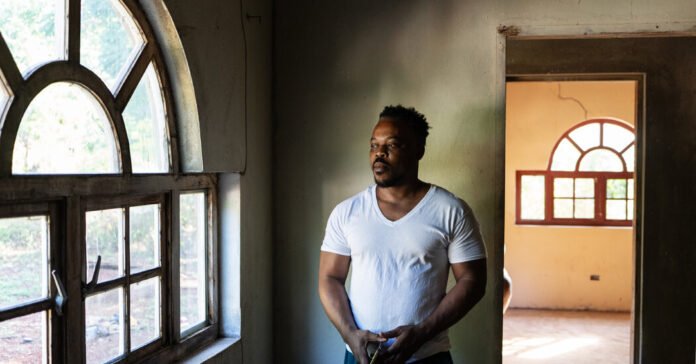Nascimento Blair: A Return to Jamaica in Shackles
Nascimento Blair’s return to Jamaica was anything but a homecoming. After 21 years away, he stepped off the plane at Kingston’s Norman Manley International Airport, not as a welcomed son of the soil but as a man in shackles. The sun that once warmed his childhood felt foreign, and the vibrant island he remembered now seemed to cast a shadow of suspicion over him.
Dressed in a heavy winter peacoat and Chelsea boots, Mr. Blair looked out of place. He had been detained in New York City just weeks before, and the chill of that morning still lingered in his bones. As he sat in the airport, surrounded by fellow countrymen also bound by handcuffs, he felt the weight of judgment from the Jamaican authorities. “They don’t look at you like a Jamaican,” he remarked. “They look at you like a criminal.”
A Life Interrupted
Mr. Blair’s journey began in the bustling suburbs of New York, where he initially sought a better life. But a side hustle in marijuana led to a kidnapping conviction, a charge he still disputes, and a 15-year prison sentence. Despite the challenges, he worked hard to rebuild his life in the U.S. He earned two college degrees, started a trucking business, and even mentored others who had faced similar struggles. He cared for a fiancée battling breast cancer and took classes at Columbia University, striving for redemption.
Yet, all of this was overshadowed by his past. Under the early days of President Trump’s deportation campaign, Mr. Blair became one of the first immigrants to be sent back to Jamaica. His story is not just about one man; it reflects the experiences of many who have faced the harsh realities of immigration policies.
The Struggles of Re-Integration
Upon his arrival, Mr. Blair faced a daunting task: reintegrating into a society that viewed him with skepticism. The Jamaican authorities interrogated him for hours, snapping his mug shot and taking his fingerprints. The very land that once felt like home now felt like a prison. “I felt like an outcast,” he said, struggling with his slightly Americanized accent and the memories of a life he had built far away.
The public reaction in Jamaica is mixed. Some see Mr. Blair as a product of a flawed system, while others view him through the lens of his past. “We have to be careful about who we let back into our communities,” said a local shopkeeper in Kingston. “But we also need to give people a chance to change.”
A Community Divided
In the streets of Kingston, conversations about Mr. Blair’s return reveal a community grappling with complex feelings. Many Jamaicans understand the struggles of those who have been deported, yet there’s a palpable fear of crime and safety. “We want to support our own, but we also need to protect our families,” shared a mother of two from Spanish Town.
As Mr. Blair navigates this new chapter, he faces the challenge of proving that he is more than his past. He hopes to reconnect with his roots and contribute positively to his community. “I want to show them that I’ve changed,” he said, determination in his voice.
Looking Ahead
Mr. Blair’s story is a poignant reminder of the complexities surrounding immigration and redemption. As he walks the streets of Kingston, he carries not just his past but the hopes of many who seek a second chance. Will he be able to find acceptance in a place that once felt like home? Only time will tell.

